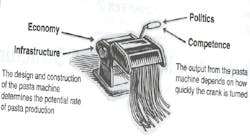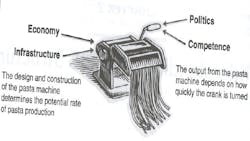The supply chain talent challenge weighs heavily on the minds of supply chain professionals. That was a key finding of MH&L’s annual salary survey both last year and this year. And as you’ll see in this year’s analysis by Dave Blanchard, respondents added another equally challenging constraint: our present government—along with the uncertain economy it has wrought, its burdensome regulations, unclear policies and failure to keep us competitive in global markets.
These things make the job of supply chain manager that much more difficult. In fact it has some thinking that supply chain management is becoming too complicated a task to be handled by the current crop of business school graduates. A new book about this challenge, "Global Supply Chains," characterizes it as EPIC. That’s actually both an adjective and an acronym invented by the authors (Mandyam M. Srinivasan, Theodore P. Stank, and Kenneth J. Petersen, all Ph.D. professors at the University of Tennessee, Knoxville, and Philippe-Pierre Dornier, Ph.D. professor of operations management at ESSEC Business School in Paris, France). They put this label on a supply chain framework encompassing Economy, Politics, Infrastructure and Competence. They use this framework to evaluate Global Supply Chains region by region. That’s something supply chain managers must be able to do in today’s world, they say.
“Managing a complex global supply chain requires the manager to recognize and assess the quantitative factors that can affect decisions on procurement, manufacturing, warehousing, logistics, distribution and sales,” they write. “The EPIC structure assesses the maturity level of geographic regions around the world …with respect to their supply chain activities.”
The authors conclude that supply chain managers will have to learn to deal with regional “pods” of demand, and that these managers will need access to information to help them coordinate multiple inputs and outputs among various enterprises spread across several countries –then learn how to mitigate the effects of time delays and cost distortions as well. Complicated? No more complicated than a pasta machine. The authors do a nice job of summarizing this challenge, comparing it to the form and function of a spaghetti maker, where how well it produces product depends on both how well the machine is designed (economy and infrastructure) as well as how competently the machine is used (as determined by politics and operator competence).So, in this light, are our educational institutions producing master chefs who’ll be able to use the tools with which they’re equipped to grind out the gross national products of their countries to their citizens? Depends on their ability to process the raw materials—and that’s raw data. Some would argue that what we need to graduate are not supply chain majors but data science majors. I read an article in the Cleveland Plain Dealer a couple weeks ago that that’s just what Robert Herbold envisions. He himself is the product of 26 years at Procter & Gamble and then seven at Microsoft, eventually becoming its chief operating officer. Herbold has committed $2.6 million to endow the Robert J. Herbold Professor of Informatics and Analytics at the Case Western Reserve University School of Engineering.
“The unprecedented amount of information available today demands far more sophisticated approaches to analysis and execution,” he said. “Those who understand how data works and what it can yield will carry enormous advantage in the new economy.”
Maybe our academic institutions are wising up about their approach to supply chain management. They’re realizing it requires a kind of supply chain management of their own. That’s why the faculties of various disciplines at CWRU are cooperating to create a data sciences program combining coursework in advanced mathematics, statistics and computer programming with study of how those data are applied in disciplines such as energy, health and manufacturing.
Sounds like the blueprint for a great pasta maker. Let’s see if academia can master the art of grinding out the mass and quality of talent necessary to satisfy the world’s many market appetites.
(View a slideshow of the data tables from MH&L's 2014 Salary Survey by clicking HERE.)





